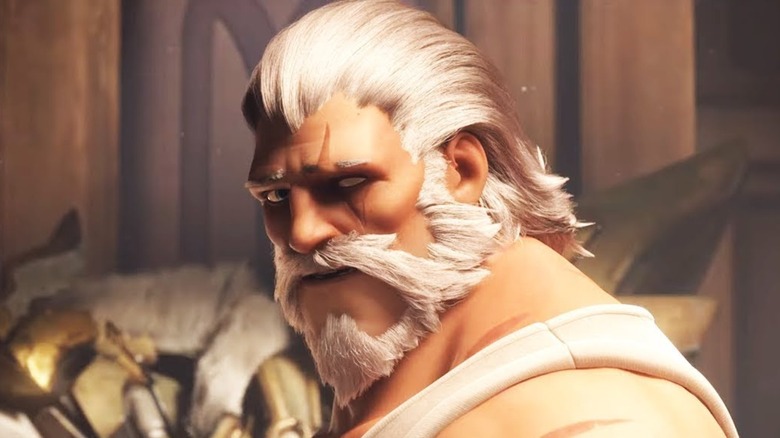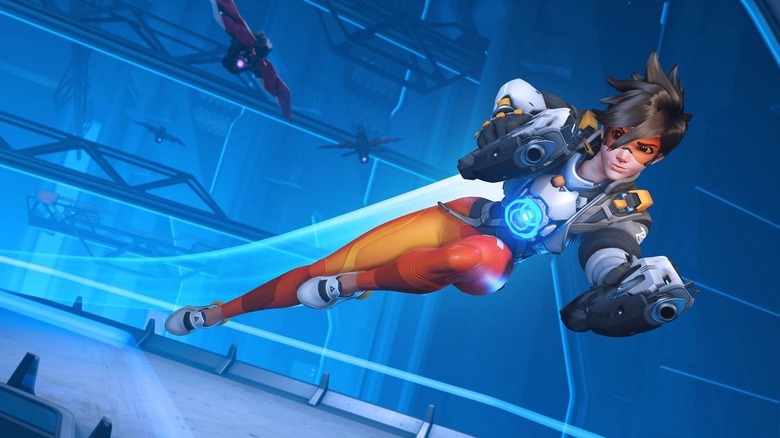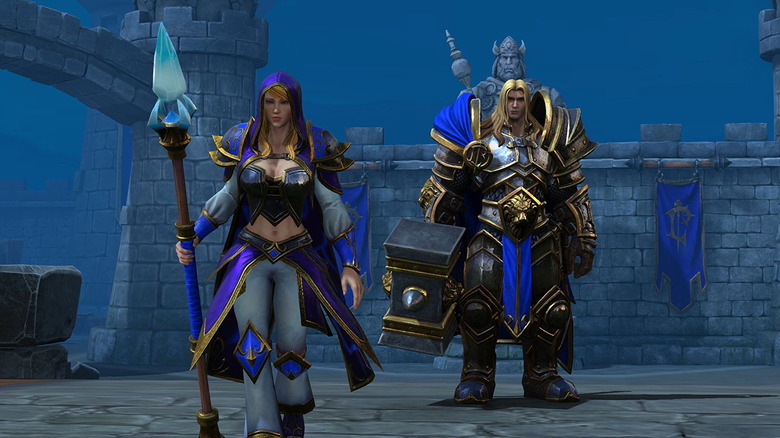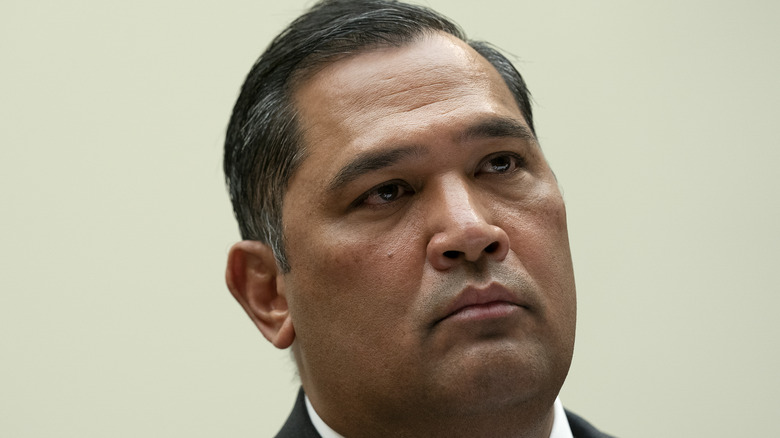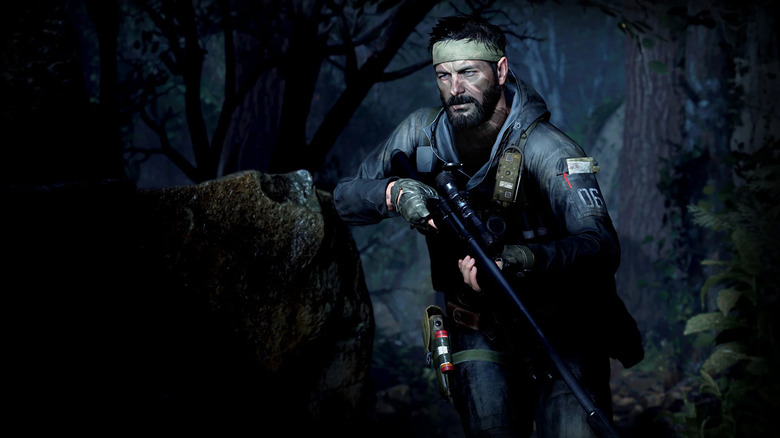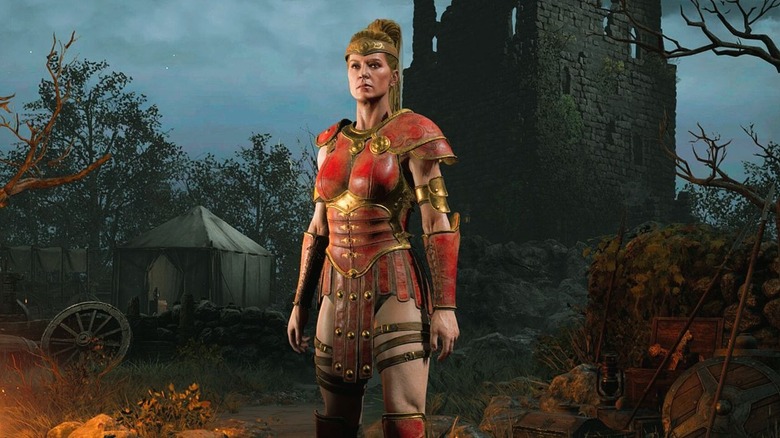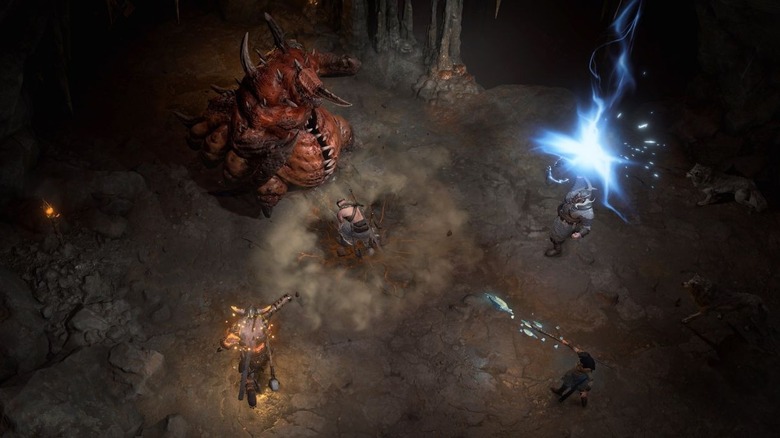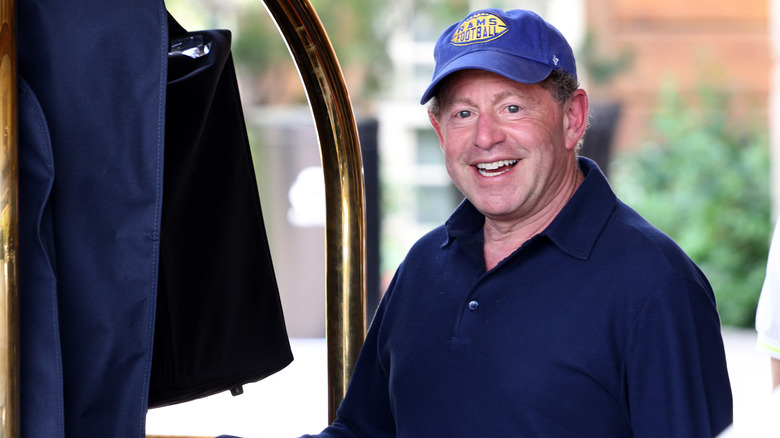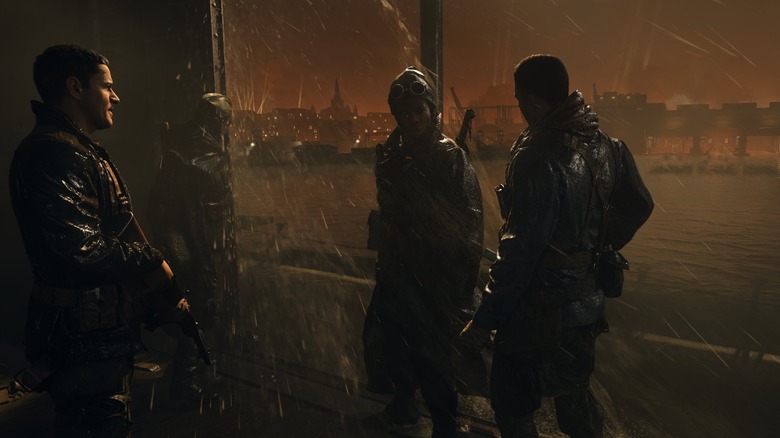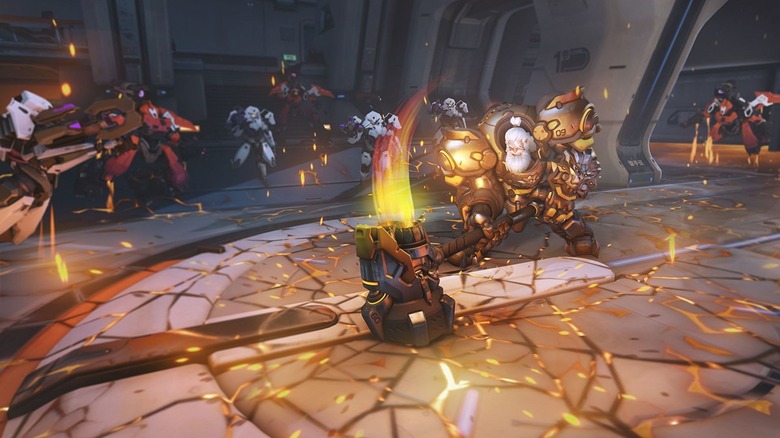The Shady Side Of Activision Blizzard
Lawsuits have kept piling up for Activision Blizzard throughout one of the most tumultuous years in the company's history. The gaming giant is currently being sued by the California Department of Fair Employment and Housing, as well as its own shareholders. Meanwhile, its employees are staging walkouts, and fans are abandoning the company en masse.
In addition to reports of widespread layoffs (despite record-breaking profits), Activision Blizzard faces serious allegations of rampant sexual harassment in its workplace, unfair labor practices that amount to union-busting, and cover-ups from high-level executives like CEO Bobby Kotick.
The company's fans are seeing red as a new revelation about its toxic culture drops seemingly every week, and for the most part, Activision Blizzard seems dead set on denying the charges against it while trying to wait out the storm. 2021 will likely be remembered as a year of reckoning for one of the biggest companies in gaming. While Activision Blizzard struggles to clean up its act, here's a look at the shady side of the company's practices.
Activision Blizzard's strangely slow years
Even before the divisive events of 2021, Activision Blizzard wasn't in the best place when it came to fan support. Blizzard released "Overwatch" in May 2016, but after that came a long period without any major releases.
According to IGN, from the release of "Overwatch" onward, the company had many ill-fated projects at various stages of development, including a first-person shooter set in the "StarCraft" universe. Nothing resulted into a full new release for the developer. Despite the success of games like "Overwatch" and "Hearthstone," Blizzard slowly become the least-profitable half of the company, and that had a huge impact on employee morale.
In the wake of those fallow years, Blizzard started losing some of its most talented team members. Chris Metzen, who'd been working with Blizzard since the 90s, notably left the company to form his own studio, Warchief Gaming, in 2018. "I think during those years I burned out really hard," he told IGN. Other employees followed, with many leaving Activision Blizzard for smaller studios and less pressure. In retrospect, the employee flight that took place from 2018 onward may have hinted at the deeper problems within Activision Blizzard.
Dwindling employee compensation and layoffs
The slow pace of releases did more than just burn out already-exhausted employees. It also tightened budgets at the company and lowered employee compensation across the board. In 2018, Variety reported that Blizzard was ending its holiday bonus program, instead incorporating that money into its employees' base salaries. While the company maintained that the move was made to benefit employees, many expressed concerns that the decision signaled a lack of confidence in Blizzard's future profits.
Those critics may not have been wrong. In February 2019, the company laid off over 800 employees, stating that "some teams are out of proportion with our current release slate" (via IGN).
Of course, when times are tough, every company needs to make difficult decisions and cut expenses where they can. When the pandemic struck in 2020, the company needed to cut down further, but it quickly became evident to employees that the higher-ups weren't willing to sacrifice alongside everyone else.
In 2020, Bloomberg reported that Activision Blizzard employees had begun comparing salaries with each other, and they were almost unanimously disappointed with what they found. While their salaries were on the lower side when compared to others in the gaming industry, Activision CEO Bobby Kotick continued to take home millions. In response to employee outcry, Kotick agreed in 2021 to take a 50% pay cut to his base salary — but that still left him the option to see upwards of $200 million based on the company's performance (per gamesindustry.biz).
Tensions between Activision and Blizzard
Ever since merging with Activision back in 2008, Blizzard has been developing its games without much direct influence from Activision, but in some ways that is beginning to change. An anonymous source from inside Blizzard told IGN about the developer's diminishing power within the larger company. "Realistically, the way big companies work is 'if you make them money, you set the culture," said the source. "And Blizzard doesn't make them money. 'Call of Duty' does, and they set the culture."
While game development at Blizzard is typically left untouched, other areas are at the mercy of the larger corporation. When those massive layoffs rolled across Activision Blizzard in February 2019, a large number of community and esports departments were affected — greatly reducing the amount of Blizzard employees at Activision Blizzard. These layoffs also came after a "record year" for the company (per GamesIndustry.biz), making the downsizing one of the shadiest moves at Blizzard.
Another example of the tensions between Blizzard and the company at large arrived in March 2021. Kotaku first reported that Activision Blizzard had quietly hired Brian Bulatao, a former member of the Trump administration, as the company's new chief administrative officer. In addition to his administrative roles, Bulatao was also put in charge of the nonprofit Call of Duty Endowment. IGN revealed that many employees at Blizzard were unhappy and even "speechless" when it came to the decision to hire Bulatao, but they ultimately acknowledged that they had very little say in what the greater Activision Blizzard chose to do.
Activision Blizzard's 'frat boy culture'
While the past few years have been less than ideal for Activision Blizzard in terms of performance, 2021 was a disaster for the company. In June, the California Department of Fair Employment and Housing filed a serious lawsuit against the company, following up on a two-year investigation into its workplace practices and culture.
The lawsuit accuses Activision Blizzard of cultivating a "frat boy culture" in which women employees are routinely undervalued and outright harassed. Among other incidents, according to Bloomberg Law, the lawsuit cites accounts of men delegating tasks to female employees in order to play video games, mothers being kicked out of lactation rooms so meetings could be held there, and a "cube crawl" where male employees drank "copious" amounts of alcohol while moving from cubicle to cubicle to hit on women. While the final result of the suit remains unclear, changes are already taking place at the company.
August 2021, after hundreds of employees staged a walkout and thousands of fans signed petitions denouncing Activision Blizzard's practices, its president and its head of human resources stepped down from their positions (per GamesIndustry.biz). In response to the lawsuit being filed, Activision Blizzard released a dismissive statement denying all of the allegations. Activision CEO Bobby Kotick would later apologize for the company's response, calling it "tone deaf."
Underwhelming response
Since the employee walkout staged in the wake of California's lawsuit against Activision Blizzard, there have been some signs of improvement at the company. In an open letter from Bobby Kotick, the company announced a new zero-tolerance harassment policy, promised to hire fifty percent more women and non-binary employees, waived required company arbitration for sexual harassment claims, and committed to making quarterly progress updates.
Those would appear to be strides forward, but behind the scenes, the company is allegedly still making moves to silence its employees. To review its internal policies, Activision Blizzard tapped the law firm WilmerHale, which Kotaku noted is notorious for helping big companies resist worker organization. Employees took this as a sign that Activision Blizzard would be resisting any major changes to its practices, and thousands voiced their objection of the decision.
Because of this, a group of employees formed the ABK Workers Alliance, which set about drafting new employee-led initiatives to help improve the culture of the workplace and employee morale (via IGN). A mentorship program aims to help employees advise one another on issues outside of official work channels. Regularly scheduled "open listening sessions" are being recorded and shared as a way of encouraging conversations about Activision's workplace culture, and monthly community meetings will be allowing employees to further organize and express their concerns in a secure forum.
Union busting
Workers at Activision Blizzard spent much of the summer of 2021 organizing and raising awareness of the poor working conditions at the company. While they didn't formally unionize, thousands of employees came together under the banner A Better ABK, organizing further walkouts and using social media to spread the word about employee efforts to improve the company.
Unfortunately, instead of working with these upset employees, Activision Blizzard allegedly tried to keep them from organizing further. The company's actions led to the Communications Workers of America filing unfair labor practices charges with the National Labor Relations Board. The CWA's filing alleges that Activision Blizzard repeatedly threatened its employees, discouraging them from communicating with each other about wages and working conditions, and even attempted to restrict their use of social media to organize (via Forbes).
The filing also took aim at Activision Blizzard's choice to work with the law firm WilmerHale. CWA national organizing director Tom Smith released a statement which said, "Management could have responded with humility and a willingness to take necessary steps to address the horrid conditions some ABK workers have faced. Instead Activision Blizzard's response to righteous worker activity was surveillance, intimidation, and hiring notorious union busters."
Unfair compensation
It's not just the company culture that's suffering at Activision Blizzard. Many of the company's employees claim they've been severely underpaid. In August 2020, Bloomberg reported some employees at the company were allegedly skipping meals to save money, whereas CEO Bobby Kotick was making millions each year. On top of that, the lawsuit from California's Department of Fair Employment and Housing revealed that women at Activision Blizzard are consistently paid less than their male counterparts, even for performing similar jobs and regardless of seniority (via Forbes).
The lawsuit led to Blizzard president J. Allen Brack being replaced by Jen Oneal and Mike Ybarra in August 2021. Oneal had previously led Vicarious Visions, and she'd been working with Activision for over twenty years (via IGN). Three months into her new role, Oneal shocked the company by announcing her resignation.
The Wall Street Journal later reported that Oneal's departute was due in part to the fact that she was being paid less than Ybarra, despite the two of them sharing the exact same position within the company. Oneal said she felt "tokenized, marginalized, and discriminated against." IGN shed some light on the controversy, revealing that Oneal and Ybarra had both requested that Activision pay them the same amount, but the company had refused, only offering Oneal equal compensation after she announced her resignation.
The board backs Bobby
Much of the backlash surrounding California's lawsuit against Activision Blizzard has been aimed directly at the company's CEO, Bobby Kotick. Kotick claimed he had no knowledge of any of the issues unearthed by the Department of Fair Employment and Housing and downplayed the incidents cited in the ensuing lawsuit.
In August 2021, a group of Activision Blizzard shareholders filed a new lawsuit which specifically named Kotick, claiming that he had "economically damaged" them through his handling of the harassment lawsuit and earlier "materially false" reports about the company's culture.
Things went from bad to worse when The Wall Street Journal released a bombshell report in November, which claimed that Kotick had for years been aware of the toxic culture at Activision Blizzard. Shortly after coming under fire for these claims, Kotick released a statement denying them all outright. His denial did nothing to quell the outrage of his employees, however, and the ABK Workers Alliance announced it would be staging another walkout — and demanded Kotick be removed from his position at the company.
Meanwhile, the Activision Blizzard Board released a statement saying, "The Board remains confident that Bobby Kotick appropriately addressed workplace issues brought to his attention." Whether or not the Board has confidence in Kotick, the company's shareholders appear to be losing it, and fast. A group representing 4.8 million shares in the company asked for Kotick's resignation in a public letter (via The Washington Post).
The problems go federal
By September 2021, Activision Blizzard faced lawsuits from the California Department of Fair Employment and Housing and some of its own shareholders, as well as charges of unfair labor practices and continued outcry from employees and customers. Then the U.S. government put the company in its crosshairs.
According to a report from The Wall Street Journal, the Securities and Exchange Commission has begun a new investigation into the company. Specifically, the SEC has requested records for six former employees and has subpoenaed CEO Bobby Kotick and other executives at the company.
The report reveled that the SEC wants Activision Blizzard's executives to turn over any communications they've had about the ongoing harassment issues at the company. While the SEC will be leaving harassment investigations to other parties, it does want to examine whether or not executives at the company covered up harassment complaints and hid them from shareholders. Activision Blizzard is required to disclose to shareholders any information that could potentially damage their earnings.
Only time will tell what the latest phase of the investigation will uncover, but the damage to Activision Blizzard's reputation is indisputable. Activision Blizzard was notably missing from the 2021 Game Awards, with host Geoff Keighley explaining to fans, "There is no place for abuse, harassment or predatory practices in any company or any community."

